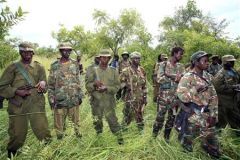South Sudanese suffer as Ugandan rebels gather
June 26, 2007 (YAMBIO, Sudan) — In tiny clay huts, south Sudanese villagers sleep uneasily in fear of being attacked by Ugandan Lord’s Resistance Army rebels.
 Under terms of a ceasefire between the Ugandan government and the rebels, fighters who have terrorised northern Uganda are supposed to gather near Ri-Kwangba in southern Sudan.
Under terms of a ceasefire between the Ugandan government and the rebels, fighters who have terrorised northern Uganda are supposed to gather near Ri-Kwangba in southern Sudan.
But residents near the site complain the truce that has brought peace to their neighbour has brought conflict to their doorstep and threatens development in the impoverished region which is emerging from 20 years of civil war.
More than 70 houses were ruined in an attack on one village near the main town Yambio, a few miles from Ri-Kwangba in the months following the LRA’s move westwards. Four people were taken away to carry stolen food and valuables for the rebels.
Their bodies were later found in the nearby forest.
Seven others have gone missing while looking for honey in the thick jungle surrounding the area, but the villagers are too afraid to search for them, said Zachariah Nzari, a local tribal chief, his angry eyes clouding over as he remembered.
“My hut was the first to be destroyed,” said Nzari. “We are all worrying, the LRA are occupying the forest, if anyone meets them they will kill him. He will not return back,” he added. He who lives three miles from where the LRA gathers.
The LRA denies responsibility for any attacks. And with myriad armed militias and many civilians carrying weapons, it is not always easy to apportion blame in south Sudan.
UNRESOLVED INSURGENCY
In January 2005, south Sudan signed a peace deal with the Khartoum-based government to end Africa’s longest civil war. Since independence half a century ago, south Sudan has been embroiled in conflict for all but 11 years.
During Sudan’s north-south war, the LRA sought refuge in lawless south Sudan, out of reach of Ugandan army troops and, Kampala says, supported by Khartoum’s government.
But instead of reaping the benefits of their peace, Sudanese living near Ri-Kwangba have found themselves caught up in Uganda’s unresolved insurgency.
The LRA, which believes Uganda should be ruled by the Biblical Ten Commandments, is feared for abducting children as soldiers or slaves, and mutilating victims by chopping off their lips or ears. Around 1.6 million people have been forced into camps in northern Uganda in the two decades of conflict.
Analysts say the LRA has had a less aggressive recruitment policy in south Sudan, but its presence has created an atmosphere of fear in the region.
South Sudan’s semi-autonomous government says ridding the south of the LRA is vital to the development and rehabilitation of the region, one of the poorest areas on earth.
The regional government decided mediating peace talks between the LRA and the Ugandan government were the best solution.
Although there are fewer killings since the talks began, research by aid agencies shows security systems need to be improved in the areas where the LRA is present.
FEAR, ESCAPE
Militarily the LRA is difficult to track through south Sudan’s dense jungle — travelling on foot and in highly mobile small bands.
Losing access to the forest has affected the community’s livelihood. They now suffer from a lack of building materials, honey and other valuable products.
“(They are) also stopping us going to the gardens far from our homes to cultivate,” said Nzari.
South Sudan Vice President Riek Machar, the chief mediator of the peace talks that are taking place in south Sudan’s capital Juba, took a list to LRA leader Joseph Kony of six girls who were taken from Nzari’s community by the LRA.
Nzari says Kony said he knew where the girls were but the villagers had still not seen them. His people want their children back and they want the government to move the LRA away.
“We were not consulted about the LRA all coming to our area,” said Albino Clement, a local official.
Clement said if LRA members are to be in his country they should have refugee status and not be allowed to carry arms.
He knows too little about what is happening in Juba to judge whether peace talks will be the quickest way to rid south Sudan of the armed rebels, he said.
But Nzari is clearer.
“We are doubting. They are negotiating peace but still they come to the market with guns,” said Nzari, “All the women and children run away because they know they are bad people.”
(Reuters)
